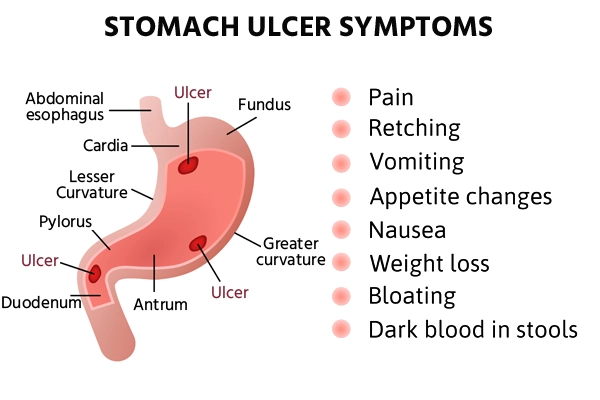Peptic Ulcer(Stomach Ulcer): Symptoms,Causes and Treatment
Stomach ulcers, also known as peptic ulcers, are painful sores that develop on the lining of the stomach, small intestine, or esophagus. These ulcers can cause discomfort, pain, and complications if left untreated. Ulcers can vary in size and severity and are often caused by factors such as infection, inflammation, or erosion of the protective lining of the affected area.
Types of Ulcers
- Gastric ulcers: Gastric ulcers, also known as stomach ulcers, are open sores that form on the stomach's lining. The area of the intestine just past the stomach is susceptible to ulcers.
- Duodenal ulcers: These are ulcers that form on the interior of your small intestine's upper part (duodenum). The bacteria Helicobacter pylori (H. pylori) and long-term use of nonsteroidal anti-inflammatory medicines (NSAIDs) such as ibuprofen and naproxen sodium can sometimes be the causes of peptic ulcers.

Secure your health with a second opinion. Make informed decisions and book your appointment today!
Get A Second OpinionPeptic Ulcer Symptoms
The most typical sign of a peptic ulcer is burning stomach discomfort. Stomach acid, as well as having an empty stomach, aggravates the pain. Eat some meals that buffer stomach acid or take an acid-reducing medication to alleviate the pain, but it may return. The discomfort may be worse between meals and at night.
Many persons with stomach ulcers have no symptoms at all. Ulcers can also generate severe indications and symptoms, such as:
- Vomiting or vomiting blood (which can be red or black)
- Feces with dark blood or stools that are black or tarry
- Breathing problems
- Feeling dizzy
- Vomiting or nausea
- Weight loss that isn't explained
- Appetite shifts
Stomach Ulcer Causes
When the inside of the stomach or small intestine is worn down by acid from the digestive system, peptic ulcers develop. An excruciating open sore that could bleed can be caused by acid. There is a mucous membrane covering your digestive tract, which typically absorbs acid. On the other hand, you run the risk of developing an ulcer if the quantity of mucus or acid is dropped.
Among the most common causes are:
Bacteria:
Helicobacter pylori bacteria are typically found in the mucous layer that covers and protects the stomach and small intestine tissues. The H. pylori bacterium usually causes no problems, but it can create stomach ulcers by inflaming the stomach's inner layer. The exact mechanism by which H. pylori infection spreads is unknown. It can be passed from one person to the next through close contact. H. pylori can also be contracted by food and drink.
Use of some pain medicines on a regular basis:
Nonsteroidal anti-inflammatory drugs (NSAIDs), which include aspirin and other over-the-counter and prescription pain relievers, can irritate or inflame the lining of the stomach and small intestine. Ibuprofen, naproxen sodium, ketoprofen, and other medicines are among them. They are devoid of acetaminophen.
Other drugs are available:
Other medications, such as steroids, anticoagulants, low-dose aspirin, selective serotonin reuptake inhibitors, alendronate, and risedronate, when taken with NSAIDs, might dramatically increase the risk of ulcers.
Risk Factors
In addition to the hazards associated with using NSAIDs, you may be at a higher risk of developing peptic ulcers if you:
- Smoke: In patients infected with H. pylori, smoking may increase the risk of peptic ulcers.
- Consume alcoholic beverages: Alcohol can irritate and dissolve your stomach's mucous lining, as well as increase the amount of stomach acid produced.
- Take Stress: Have stress that is not being addressed.
- Eating Spicy food: If you consume too spicy meals.
These variables do not create ulcers on their own, but they can aggravate them and make them more difficult to heal.
Ready to take control of your health journey? Book your appointment now and start your path towards wellness today!
Book an AppointmentDiagnosis of Ulcer
The following are the tests suggested for diagnosing an ulcer:
Endoscopy:
If the symptoms are severe, the doctor may suggest an upper endoscopy to see if you have an ulcer. The doctor uses an endoscope (a short, illuminated tube with a tiny camera) to examine for abnormalities in your throat and stomach during this treatment.
H. pylori tests:
These are now commonly available, and your doctor will design a treatment plan to alleviate your symptoms while also killing the bacteria. The quickest way to find out if you have H. pylori is to do a breath test. A blood or stool test or a sample taken during an upper endoscopy can also be used to check for it.
Imaging tests:
Imaging techniques such as X-rays and CT scans are utilized to detect stomach or peptic ulcers. You must consume a special liquid that covers the digestive tract and allows the imaging devices to see ulcers more clearly.
Stomach (Peptic) Ulcer Treatment
The following are the tests suggested for diagnosing an ulcer:
Medication:
H2-receptor antagonists, often known as proton pump inhibitors (PPIs), Let the ulcer heal by producing less stomach acid.
Antibiotics:
Antibiotics are recommended to get rid of H. pylori if it is the cause of the ulcer. Drugs that support the preservation of the stomach and small intestinal lining are known as cytoprotective drugs.
Alternative remedies:
Mastic gum, deglycyrrhizinated liquorice (DGL), probiotics, and other alternative medicines can provide some relief from ulcers.
Surgery:
In rare instances, when ulcers are unresponsive to medicine or when complications like bleeding or perforation occur, surgery may be required.
